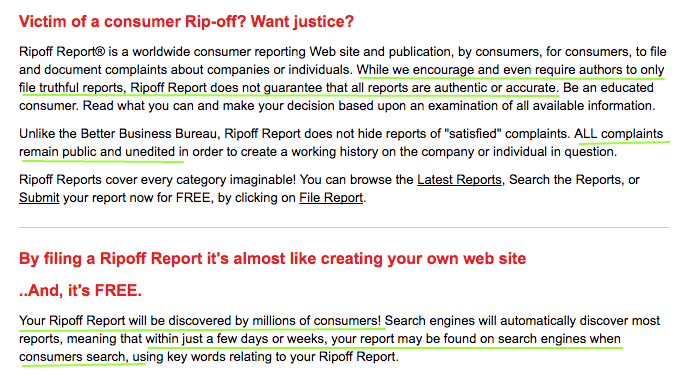RipOff Report recently underwent a subtle change that has caused reports Google previously removed from its search engine — even based on court orders — to reappear, without many people realizing it.
RipOff Report is a website notorious for refusing to remove defamatory “reviews” in the name of free speech. It hosts more than just honest consumer reviews. Many of its Reports are about individuals and can say practically anything. Many are grossly defamatory, some going so far as to accuse private individuals of nefarious crimes like prostitution or child abuse, and most including personally identifying information, like home addresses and telephone numbers.
For years, RipOff Report, which knowingly “does not guarantee that all reports are authentic or accurate,” has refused to remove any reviews. Its home page raves about its refusal to “hide” reports. Rather, it proclaims, “ALL complaints remain public and unedited” on RipOff Report.
In other words, if someone — in a tequila-influenced fit of rage — pens hideous descriptions of you, the “report,” the website says, “will be discovered by millions of consumers!” Below is a screen capture from RipOff Report’s home page (green underlines added):
 RipOff Report will not remove defamatory reports
RipOff Report will not remove defamatory reports
The website openly brags about its refusal to remove any reports, emphasizing, “If you ask us to removal [sic] a Report, the answer will be ‘NO.’” It says, “Just because you enter into some kind of an agreement to remove” content posted on the site “doesn’t mean that you can now ignore” RipOff Report’s “Terms of Service” the original author allegedly “agreed to” when posting the “Report.”
That means, if you author a defamatory Report — even if in the heat of passion — then later want to remove it, you can’t. RipOff Report’s reasoning is that it is protecting you from “being bullied into taking a Report or subsequent posting down.”
The only remaining recourse, therefore, for victims of these reports to prevent other people from reading them has been to have links to the reports removed directly from Google’s search engine — after litigation.
Google, however, will remove content from search — if you have a court order
If you, without a court order, report to Google that you have located defamatory content in its search results, it will tell you that, pursuant to Section 230(c) of the Communications Decency Act, it will “not remove allegedly defamatory material” from search. However, it will remove defamatory content from search if you have a court order.
As a result, an uncountable number of victims of RipOff Report have obtained court orders and submitted them to Google, which has removed the links from its search results.
Problem solved?
Not so fast. Ripoff Report is onto you. Or at least it appears to be.
Previously removed links recently began popping back up in search results. The reason? RipOff Report appears to have reorganized its website.
For example, for as long as I am aware until about December 2016, its URLs were structured like this:
http://www.ripoffreport.com/r/NAME/CITY-STATE-ZIP/title-of-review
However, at sometime around December 2016, it re-structured its website so the URL for each review read like this, with “r” changed to “reports”:
http://www.ripoffreport.com/reports/NAME/CITY-STATE-ZIP/title-of-review
Immediately, previously removed search results began reappearing in Google’s search results. New requests needed to be made to Google to remove them again.
At first, however, I did not notice the URLA change or realize why links were reappearing; rather, I just resubmitted the requests for removal. But when it happened again in February, it made me look more quizzically.
In February, those same, previously removed search results reappeared again in Google search. Further examination alerted me to the URL changes.
Now, the URLs are written without the ZIP code, like this:
http://www.ripoffreport.com/reports/NAME/CITY-STATE/title-of-review
These URL changes are barely noticeable because if you go to either of the previous URLs, you will be redirected to the new URL. Though subtle, these changes have caused the re-indexing of content that Google previously removed.
Did RipOff Report make these URL changes purposely so its pages that had been removed from Google would reappear? Or is there another reason, possibly dealing with search engine optimization? I don’t have the answers. I do know, however, that if you have had content removed from Google, it is a good idea to be vigilant in checking Google search to ensure it has not reappeared.
Has a defamatory review been posted about you on RipOff Report?
If you would like to speak to one of our attorneys about your matter, call our office at 407-965-5519 or email us through the contact page. You can also schedule a consultation with Attorney Conlin on her online scheduling page.
Image © Photopal604 via dreamstime.com.




Leave a Reply